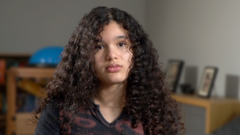
Mia, a 14-year-old teenager, struggles with mental health challenges that have profoundly impacted her life. Unable to move the lower part of her body due to a suicide attempt, she now uses a wheelchair and lives in a second-floor flat without a lift, forcing her to shuffle down stairs on her bottom.
Her mental health journey began early, with her mother Christina seeking help when Mia was five years old. Initially diagnosed with obsessive-compulsive disorder (OCD), Mia and her mother believed she was on the autism spectrum. Despite multiple attempts to get a proper assessment, Mia was repeatedly overlooked by mental health services.
The diagnosis of autism finally came towards the end of her first year in secondary school, providing some educational support but minimal psychiatric help. The mental health support Mia received was inconsistent – occasional eight-week CBT courses followed by long periods of no treatment.
Recent NHS data reveals a troubling trend in youth mental health services. Analysis shows that more than half of young people receiving psychiatric support show no improvement in their health. The charity Mind reports that the number of young people experiencing poor mental health rose from one in nine to one in five between 2017 and 2023.
In the summer of 2023, Mia was prescribed antidepressants, which reportedly contributed to her developing an eating disorder. Her mental health continued to deteriorate, leading to suicide attempts. In March, a suicide attempt resulted in severe spinal injuries, leaving her paraplegic and forcing her to relearn basic motor skills.
NHS England’s monthly data further highlights the challenges in mental health treatment:
– 46% of treatments showed improvements
– 10% showed measurable deterioration
– 44% showed no measurable change
Mia’s current living situation presents additional challenges. Her housing block lacks accessibility, and her request for a stairlift has been delayed for months. Southern Housing and Islington Council are working to find a solution, but progress has been slow.
Despite these obstacles, Mia remains hopeful. She continues daily exercises to maintain muscle strength and is receiving a range of therapies, though she feels they have come “far too late”. Her message to others struggling is powerful: “No matter how odd or strange you feel, the most helpful thing you can do is speak to someone else.”
Mia’s ultimate goal is simple yet profound: “One day, I’m going to be proud of myself. That’s what I’m looking towards, a place where I can be proud of how much I’ve overcome.”
Her story highlights the critical need for improved mental health services, early intervention, and comprehensive support for young people experiencing mental health challenges.








